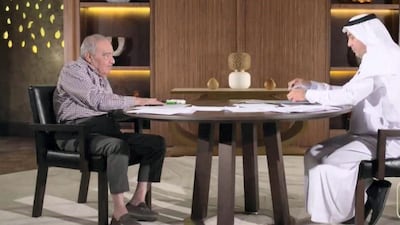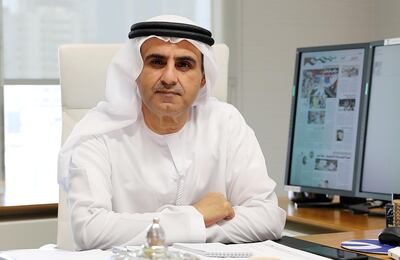A landmark television programme featuring a respected academic’s modern take on Islam was the most watched on Abu Dhabi TV in a decade – despite sparking intense debate and reaction on social media platforms and fierce criticism from radical groups across the region.
The series, La'allahum Ya'qilun (So They May Reason) ran nightly during Ramadan and hosted one of the most influential scholars of moderate Islam, Dr Muhammad Shahrour.
In each episode, Dr Shahrour would discuss a topic from Islam, offering a more modern and moderate perspective on it – an approach with which the scholar has become synonymous.
The series attracted more than three million viewers, many of whom took to social media to share their opinions. Some criticised the programme for its non-traditional approach, while others praised it for prompting dialogue among Muslims.
_______________
Comment: Abu Dhabi TV's Islamic scholar may have bold ideas but extent of his following is unclear
Religious scholar sparks big debate among Ramadan television audiences
_______________
Criticism also came from radical groups outside the UAE who were attempting to "distort the image of the country and Islam", according to Dr Ali bin Tamim, who has since last year been director-general of Abu Dhabi TV's parent company, Abu Dhabi Media. Dr Tamim is leading the government media organisation's plans to broadcast more engaging and diverse content.
In the case of La'allahum Ya'qilun, the more extreme comments online called for the show's cancellation and the deportation of Dr Shahrour, labelling him a heretic.
But Dr Tamim said ADM kept broadcasting it because the series promoted tolerance and added value to the Arab world.
"There were obvious efforts to distort the image of the UAE and its media. The UAE's message is based on credibility, tolerance and acceptance. It is based on knowledge and its rich Arabic culture," Dr Tamim told The National.
A programme that encourages a reinterpretation of Islam embodies the UAE’s efforts to combat extremism, Dr Tamim said.
Religious programmes are common across the Arab world, during Ramadan and throughout the year. Dr Shahrour's programme was one of four religious programmes broadcast this holy month on Abu Dhabi TV.
Dr Shahrour called on people to consider Islam and the Quran from multiple perspectives, in particular to reassess physical punishment set out in Sharia, and consider fines or jail time instead.
He said a literal translation and following of religious texts published hundreds of years ago could not be entirely compatible with modern day and is not what God intended.
“The UAE’s main message is not to depend on the religious speeches of certain individuals, but instead to listen to different views. We reject hatred and violence,” Dr Tamim said.
He said there were many TV programmes available across the Arab world that spouted extremist ideologies and La'allahum Ya'qilun sought to counter them by providing an alternative voice.
“For those who want the opinions of radical extremists, then there are specific television channels they can watch instead such as Al Jazeera, that host them throughout the day and night,” Dr Tamim said.
Al Jazeera has given a platform to Yusuf Al Qaradawi, who is a spiritual leader for the Muslim Brotherhood and on a designated terrorist list. He hosts a show called Sharia and Life.
It is these shows, Dr Tamim said, that are the true danger to humanity and the ones that should be criticised.
"La'allahum Ya'qilun and Dr Shahrour do not claim that they know the universal truth and true doctrine. It is a respected academic's research and readings on the Quran and religious texts," he said.
He asked those who have criticised the series to instead focus their efforts on extremists who are "constantly calling on people to murder and destroy, instead of attacking a scholar who appeared for an hour a day during Ramadan and who calls for tolerance and acceptance.
“Abu Dhabi TV supports positive thinking. We make no claims on religion, culture and heritage.”
Throughout the show, Dr Shahrour repeatedly asked viewers to challenge his ideas.
In the first episode, which attracted more than 200,000 views on YouTube, Dr Shahrour stressed that his ideas are constantly being updated and revised.
He said his opinions are based on his years of research. Dr Shahrour made sure to clarify that he is not an Islamic preacher or mufti.
_______________
Read more:
Omar Ghobash tells young Muslims it’s all right to question
No future for political Islam in Middle East, experts say
Ramadan show puts Islam’s humanity before practice
_______________
Dr Tamim said that most of the criticism of the show was baseless, and in some cases extremists were behind it.
“The committee and I personally found no proof that Dr Shahrour has criticised or offended anyone or defamed Islam,” he said, referring to Abu Dhabi Media’s permanent committee that reviews content.
"The loudest criticisms came from those who want the politicisation of Islam, such as Kuwaiti extremist Ibrahim Al Awadhi, who accused Shahrour of promoting homosexuality and alcoholism. They want only their voices in the community," Dr Tamim said.
While there were some objections from Emiratis in the UAE, Dr Tamim said these opinions were typically based on hearsay.
“The strongest opposition came from outside the UAE, from members of radical political organisations who want to own the truth and enforce their radical version of Islam on all.”
Such people, he said, reject independent thought and so took it upon themselves to attack Dr Shahrour and the UAE.
Opposition to any kind of enforcement of a radical Islamic form of governance is "why the UAE is part of the coalition" in Yemen, Dr Tamim said. The UAE is part of a Saudi-led effort to restore the internationally recognised government there, which is fighting against Iran-backed Houthi rebels.
“Those who believe that they can stop ideas such as Dr Shahrour’s are delusional.
“This age has ended. The UAE is strong, as is its culture and history. We are leaders in educational and cultural endeavours and ancient ideologies are of no use to us.”
Dr Tamim said Abu Dhabi Media would continue to host academics and scholars such as Dr Shahrour, who base their opinions on thorough research, have new perspectives and modern-day representations of Islam.
He said programming such as La'allahum Ya'qilun also represents the dawning of a new media that encourages individuals to think for themselves.
"Those who want to stop the wheel of time and our interpretations and readings of religious text will not find what they want at La'allahum Ya'qilun," he said.
“Those who think that the role of religious programmes is to revive radical thinking, will not find that in our programmes on Abu Dhabi TV.”


